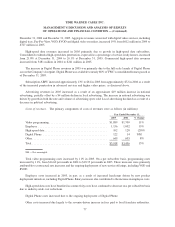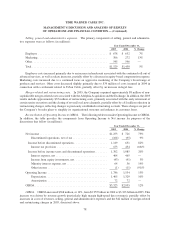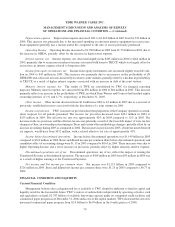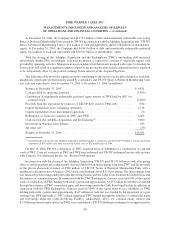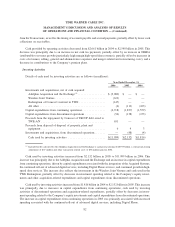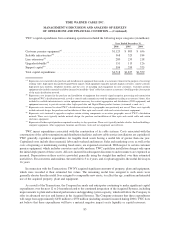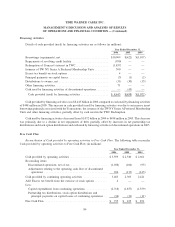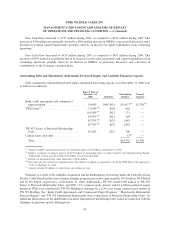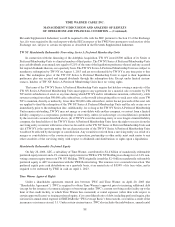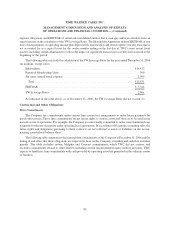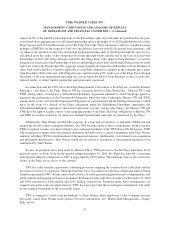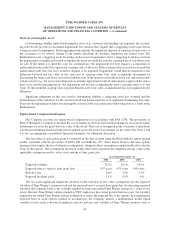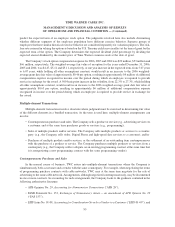Time Warner Cable 2006 Annual Report Download - page 92
Download and view the complete annual report
Please find page 92 of the 2006 Time Warner Cable annual report below. You can navigate through the pages in the report by either clicking on the pages listed below, or by using the keyword search tool below to find specific information within the annual report.paper was supported by the Cable Revolving Facility. TWC’s unused committed capacity as of December 31, 2006
was $2.798 billion, net of $17 million unamortized discount on commercial paper and including $51 million of cash
and equivalents.
On December 4, 2006, TWC entered into a $6.0 billion unsecured commercial paper program (the “New
Program”) that replaced its previous $2.0 billion commercial paper program (the “Prior Program”). TWC’s
obligations under the New Program are guaranteed by TW NY Holding and TWE, both subsidiaries of TWC, while
TWC’s obligations under the Prior Program were guaranteed by ATC, WCI (both subsidiaries of Time Warner but
not of TWC) and TWE. Commercial paper issued under the New Program is supported by the unused committed
capacity of the Cable Revolving Facility. The commercial paper issued under the New Program ranks pari passu
with TWC’s, TWE’s and TW NY Holding’s other unsecured senior indebtedness.
No new commercial paper was issued under the Prior Program after December 4, 2006, and the Prior Program
was terminated on February 14, 2007, upon the repayment of the last remaining notes issued thereunder. As of
December 31, 2006, there was approximately $1.500 billion of commercial paper outstanding under the New
Program and approximately $652 million of commercial paper outstanding under the Prior Program.
TWE Notes
During 1992 and 1993, TWE issued the TWE Notes publicly in a number of offerings. The maturities of these
outstanding issuances ranged from 15 to 40 years and the fixed interest rates range from 7.25% to 10.15%. The
fixed-rate borrowings include an unamortized debt premium of $140 million and $154 million as of December 31,
2006 and 2005, respectively. The debt premium is amortized over the term of each debt issue as a reduction of
interest expense. As discussed below, TWC and TW NY Holding have each guaranteed TWE’s obligations under
the TWE Notes. Prior to November 2, 2006, ATC and WCI each guaranteed pro rata portions of the TWE Notes
based on the relative fair value of the net assets that each contributed to TWE prior to the TWE Restructuring. On
September 10, 2003, TWE submitted an application with the SEC to withdraw its 7.25% Senior Debentures (due
2008) from listing and registration on the NYSE. The application to withdraw was granted by the SEC effective on
October 17, 2003. As a result, TWE has no obligation to file reports with the SEC under the Securities Exchange Act
of 1934, as amended (the “Exchange Act”).
Pursuant to the Ninth Supplemental Indenture to the TWE Indenture, TW NY, a subsidiary of TWC and a
successor in interest to Time Warner NY Cable Inc., agreed to waive, for so long as it remained a general partner of
TWE, the benefit of certain provisions in the TWE Indenture which provided that it would not have any liability for
the TWE Notes as a general partner of TWE (the “TW NY Waiver”). On October 18, 2006, TW NY contributed all
of its general partnership interests in TWE to TWE GP Holdings LLC, its wholly owned subsidiary (the “TWE GP
Transfer”), and, as a result, the TW NY Waiver, by its terms, ceased to be in effect. In addition, on October 18, 2006,
TWC, together with TWE, TW NY Holding, ATC, WCI and The Bank of New York, as Trustee, entered into the
Tenth Supplemental Indenture to the TWE Indenture. Pursuant to the Tenth Supplemental Indenture to the TWE
Indenture, TW NY Holding fully, unconditionally and irrevocably guaranteed the payment of principal and interest
on the TWE Notes.
On October 19, 2006, TWE commenced a consent solicitation to amend the TWE Indenture to simplify the
guaranty structure of the TWE Notes and to amend TWE’s reporting obligations under the TWE Indenture. On
November 2, 2006, the consent solicitation was completed, and TWE, TWC, TW NY Holding and The Bank of
New York, as Trustee, entered into the Eleventh Supplemental Indenture to the TWE Indenture, which (i) amended
the guaranty of the TWE Notes previously provided by TWC to provide a direct guaranty of the TWE Notes by
TWC, rather than a guaranty of the TW Partner Guaranties (as defined below), (ii) terminated the guaranties (the
“TW Partner Guaranties”) previously provided by ATC and WCI, which entities are subsidiaries of Time Warner,
and (iii) amended TWE’s reporting obligations under the TWE Indenture to allow TWE to provide holders of the
TWE Notes with quarterly and annual reports that TWC (or any other ultimate parent guarantor, as described in the
87
TIME WARNER CABLE INC.
MANAGEMENT’S DISCUSSION AND ANALYSIS OF RESULTS
OF OPERATIONS AND FINANCIAL CONDITION — (Continued)


